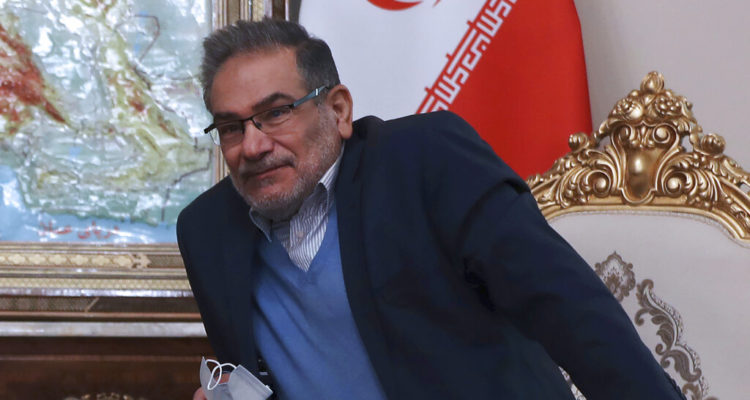“Getting out of the deal was one of the worst mistakes that have been made in recent years,” Secretary of State Antony Blinken stated.
By Associated Press
A top Iranian official said Monday that his country is seeking “creative ways” to restore its nuclear deal with world powers after Russia’s foreign minister linked sanctions on Moscow over its war on Ukraine to the ongoing negotiations.
The tweet by Ali Shamkhani, the secretary of Iran’s powerful Supreme National Security Council, offers the first high-level acknowledgment of the demands of Russian Foreign Minister Sergey Lavrov.
“Vienna participants act & react based on interests and it’s understandable,” Shamkhani wrote. “Our interactions … are also solely driven by our people’s interests. Thus, we’re assessing new elements that bear on the negotiations and will accordingly seek creative ways to expedite a solution.”
Shamkhani later tweeted criticism of the United States; earlier, he avoided directly mentioning Russia.
In recent days, negotiators on all sides in Vienna had signaled that a potential deal was close as the head of the UN nuclear watchdog agreed to a timetable with Iran for it to answer the watchdog’s long-standing questions about Tehran’s program.
But Lavrov on Saturday said he wanted “guarantees at least at the level of the secretary of state” that the U.S. sanctions would not affect Moscow’s relationship with Tehran. That threw into question the months of negotiations held so far on restoring the 2015 deal, which saw Iran agree to drastically limit its enrichment of uranium in exchange for the lifting of economic sanctions.
On Sunday, U.S. Secretary of State Antony Blinken called Lavrov’s demand “irrelevant” as the nuclear deal and sanctions on Moscow over the Ukraine war were “totally different.” The United States under then-President Donald Trump unilaterally withdrew from the accord in 2018, setting off years of tensions and attacks across the Mideast.
“Getting out of the deal was one of the worst mistakes that have been made in recent years. It let the entire Iranian nuclear program that we put in a box out of the box,” Blinken told CBS’ “Face the Nation” talk show. “And so if there’s a way of getting back to reimplementing that deal effectively, it’s in our interest to do it and we’re working on that as we speak. It’s also in Russia’s interest.”
Speaking on Monday in Tehran, Iranian Foreign Ministry spokesman Saeed Khatibzadeh said that “peaceful nuclear cooperation” between China, Iran and Russia shouldn’t be limited by sanctions. China and Russia are part of the deal, which also includes Germany, Britain and France. The U.S. has sat out of the talks since its withdrawal.
“So far Russia had shown a constructive approach for reaching a collective agreement in Vienna and we interpret what they say in this framework,” he said. “We will wait for them to give us more details in Vienna.”
He added Iran and the U.S. continued to negotiate on a possible prisoner swap, like one that accompanied the earlier nuclear deal.
“The remaining differences are less than fingers of a hand — if no one adds a new issue,” Khatibzadeh said.
‘Very complex agreement’
Iranian Foreign Minister Hossein Amirabdollahian also weighed in, vowing that Tehran “will not allow any foreign factor to affect the national interests of the country in the Vienna talks,” according to the state-run IRNA news agency.
Meanwhile, the state-owned, English-language Tehran Times newspaper on Monday published an article suggesting the draft nuclear deal in Vienna would allow Iran to “keep its advanced centrifuges and nuclear materials inside the country.”
It’s “a form of inherent guarantee to make sure that its nuclear program is fully reversible if the U.S. reneged on its commitments again,” the newspaper said, without providing a source for the information.
The 2015 nuclear deal saw Iran put advanced centrifuges into storage under the watch of the International Atomic Energy Agency, while keeping its enrichment at 3.67% purity and its stockpile at only 300 kilograms (661 pounds) of uranium.
As of Feb. 19, the IAEA says Iran’s stockpile of all enriched uranium was nearly 3200 kilograms (7,055 pounds). Some has been enriched up to 60% purity — a short technical step from weapons-grade levels of 90%.
Speaking from Vienna, IAEA Director-General Rafael Mariano Grossi said any possible renewed nuclear deal would be a “very complex agreement” with several steps and sequences. He also acknowledged his inspectors faced a challenging task filling in the gaps left by Iran holding IAEA surveillance tapes and limiting access amid the tensions.
Inspectors have to make sure everything “is perfectly accounted for to the gram,” Grossi said.




